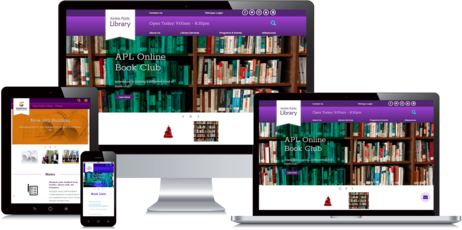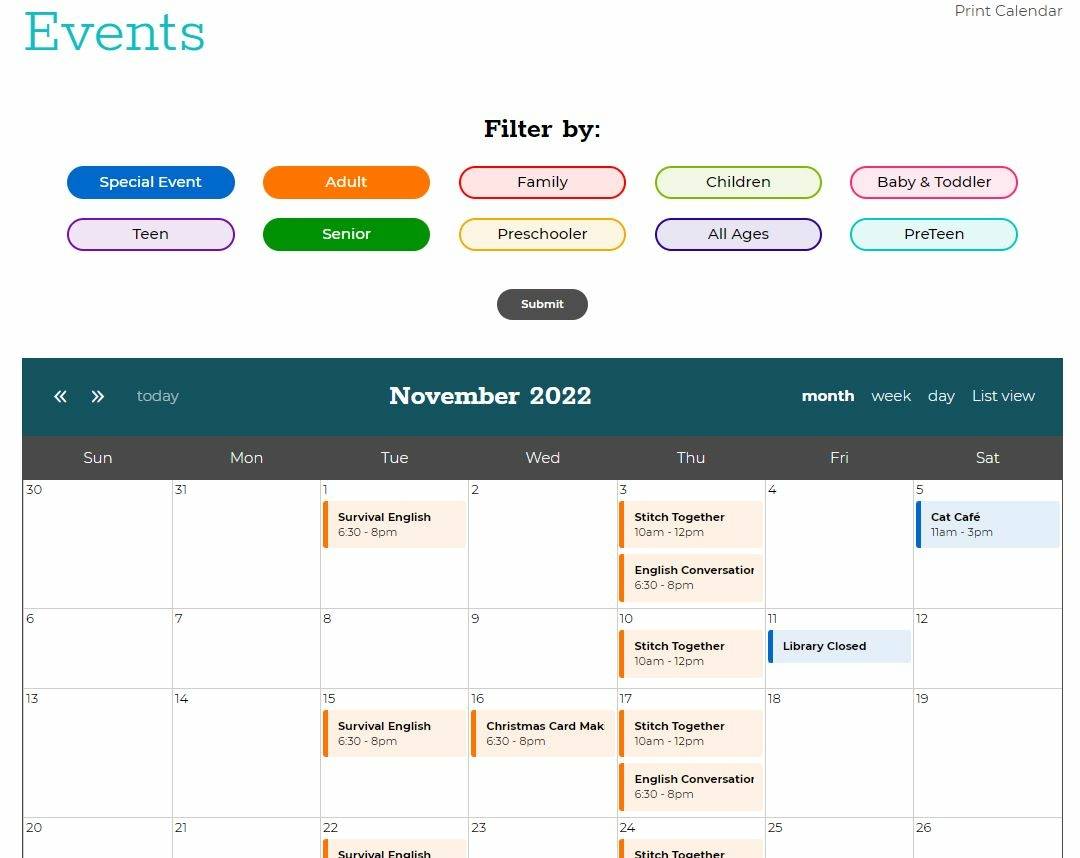Challenges
- Library websites, based on Drupal templates, were outdated and not responsive for mobile users.
- Uploading content was cumbersome, and smaller libraries could not find the time to add or update site content.
- Promoting events, a priority, was clumsy because libraries were using freeware calendars with poor functionality.
- Marigold and Peace wanted to maintain centralized management while giving branch librarians autonomy over site content.
Project Summary
- Create attractive, practical design templates for new features and demands
- Build an advanced event calendar and event registration system using Ibexa’s Form Builder
- Implement role-based editing flows for librarians to manage individual sites
- Integrate reading list functionality to third-party catalog system
- Implement multi-domain rollout at an attractive price point.
Business Benefits
- A feature-rich events calendar and registration system, including event recurrence and waiting lists, are now integrated in the system, and are a great success in local communities.
- Daily content management tasks are much more effortless.
- Technical management of the centralized platform can be done by library staff or partner.
- Initial investment will scale over a decade or more of growth.
Ibexa is in our good books, say Marigold and Peace Libraries
The Marigold and Peace Library Systems are municipal partnerships in two regions of Alberta, Canada, that strive for equal and universal access to public library services. The biggest obstacle to this ambition is geography, because Alberta – known as one of Canada’s “Prairie states” – is the size of France. Libraries in the Marigold and Peace catchment areas range from small branches that are open for only a few hours a week to hubs of civic life in larger communities. In 2018, the two Library Systems decided to co-create and co-finance a Content Management System that would harmonize website technologies and workflows across their network of public libraries while helping some 500,000 Albertans get the most out of the service.
The Marigold and Peace Library Systems needed a modern CMS solution that was robust enough to run 80+ instances and give individual libraries the flexibility to customize their sites and upload content and book list recommendations quickly and easily. Ibexa was chosen for its state-of-the-art content capabilities and easy integration with third-party data sources such as the central library catalog. Another important factor was cost-effectiveness. Because the system is flexible and forgiving, the Vancouver-based Ibexa partner Mugo Web was able to meet all the project requirements without comprise and within budget. The public library ecosystem in Alberta is not static, so the intuitive addition of new instances was another big plus for Ibexa.
The Marigold and Peace Library Systems work with a total of more than 80 municipalities in the West Canadian province of Alberta. Roughly half of the province’s 4.5 million inhabitants live in the cities of Calgary and Edmonton. “They do their own thing,” says Richard Kenig, IT Manager at Marigold Library System. “We are based around Calgary, so we do have some fairly large libraries and towns close to Calgary that have shown a lot of growth, and they serve 100,000 to 200,000 people. But we also have small communities that serve around 150 people.”
The Peace Library System operates in the north of Alberta which is more sparsely populated; its largest municipality has a population of under 70,000.
The library websites, based on Drupal templates, were outdated. “It was tricky to upload new content or make changes,” says Kenig, “which meant the smaller libraries did not have time to look after their content.”
We wanted to do something on a large scale, but without a large budget. We were looking for a solution that would be attractive and modern, but be built to focus specifically on the needs of libraries - not marketers or other types of businesses that so many web platforms are built for.
Accurate and up-to-date information is particularly important for those smaller branches in rural communities. “If your local library is an hour’s drive from where you live, you can’t just drop in to find out what events are on and when,” says Kenig. “You don’t get a flyer telling you about a writer’s residency or painting classes.”
The Marigold and Peace Library Systems decided to collaborate in implementing a CMS platform that would give the libraries in their regions a better place to host their content.
Kenig spearheaded the search for an affordable solution that would be robust enough to host all the necessary instances, have a clear system of permissioning and workflows, connect easily with the Polaris Integrated Library Systems, and be simple and intuitive to use.
“We are not-for-profit organizations, so cost-effectiveness mattered,” says Kenig. “The other non-negotiable was ease of use, because the whole point of the project was to empower libraries to be really proactive in how they communicate with their patrons.”
The Marigold and Peace website system includes a wide range of features purpose-built for libraries, based on Ibexa DXP core content and functionality models.
Kenig and the development partner of this project, Mugo Webb, agreed that Ibexa ticked all the boxes. Peter Keung, Managing Director at Mugo Web, said: “Ibexa’s extensible content model, page templating system and built-in functionality were a perfect fit for the libraries’ requirements. What we liked was that Ibexa could build the solution that we wanted, and that we did not have to modify our requirements to suit the platform.”
The new sites were rolled out in 2019; they have proved transformational both for the approximately 200 users of the system and the library patrons in the Marigold and Peace municipalities.
“First of all, the Drupal-based sites were not responsive for mobile,” says Kenig, “which of course dated our digital presence. But one of our strategic aims is to attract younger people to our services, and mobile was indispensable for that.”
Some of the other benefits of the relaunch are:
- Visual themes
Authorized individual site managers can set key visual properties for their domain, such as color scheme and logo. Each library gets a distinctive visual identity while maintaining an easy-to-manage site structure across the system.
- Intuitive workflows
Each library can set individual permissions for page creation, content updates and other tasks. Centralized managers can push global content and setting updates to multiple sites across the system.
- Integration with centralized catalog
Librarians can create custom reading lists simply by scanning or entering am ISBN code. All information about a book item is pulled from the Polaris system, and presented on the site, Patrons can search the catalog, and reserve available titles through the site.
- Calendar and events registration
“Probably the improvement with the biggest impact,” says Kenig. Patrons can register for events directly from calendar listings which can be filtered for categories such as “Preteen”, “Baby and toddler” and “Adult”. Site operators can set limits for registration-only events, as well as waiting-list queues for popular events. Reservations are confirmed by an email triggered in the Ibexa backend, and patrons are notified if an event slot opens up. Librarians can easily export attendee lists from the Ibexa admin interface.
“The events functionalities have been a resounding success,” says Kenig. “Librarians post an event at 9am and at 9.30am slots are beginning to fill up. This tells you how great the need was for such a system.”
Kenig has observed a significant increase in the number of events organized by the libraries. “Because Ibexa has made it easier to post and manage these events, even the smaller branches now have scope to do more. And this was the aim of the project: to do more for our communities.”
Another advantage of the Ibexa platform is the ease with which a new site can be added. “This is important because population patterns shift over time. Certain smaller branches have had to close down, but other communities are expanding so funding becomes available for a new library. This is happening now. Mugo Webb has created a new, empty site for us using the overarching Marigold and Peace template which will be populated and customized in time for a branch opening.”
Marigold operates three book lockers for its rural communities. Patrons order books on the website through the catalog system and are notified when they are ready to be picked up. “They go to a locker to retrieve their books, it has a touchscreen interface, you scan your library card and take your books home. This was a godsend during Covid as you may imagine.”



